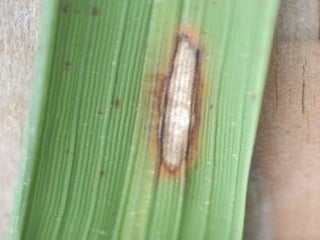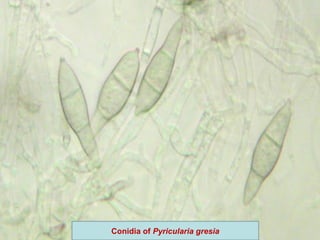Blast of rice
- 1. BLAST OF RICE DR. RAJBIR SINGH Assistant Professor Department of Plant Pathology Gochar Mahavidyalaya, Rampur Maniharan, Saharanpur (UP), India Affiliated to Ch. Charan Singh University, Meerut (UP), India Email: rajbir25805@yahoo.com, rajbirsingh2810@gmail.com Cell No. 91-9456613374
- 2. BLAST OF RICE • 1704 - Seen in Japan • 1913 – Tanjavur by Butler • Loss – 75% • Symptoms: • All parts except root infected • Appeared in Nursery • Boat Shaped water soaked spots of > 0.5 mm long
- 3. • Corner of spot – dark brown red • Middle – white grey / ash color • Spots enlarge & collapse – leaf blightning • Neck Infection / Neck Rot Phase (most dangerous) • Black grey mycelium on the neck • No grain formation/ partial formation
- 13. Pathogen – Pyricularia oryzae P. grisea (Imperfect stage) Magnaporthe grisea (Perfect stage) • Survive in seed & plant residues • Mycelium survive in puwal – 1-2 years • Survive on weeds – Penicum repens, Digitaria marginata • R. H. – 90% • Tem. – 20-25° C
- 14. Systemic Position Kingdom – Mycota/ Fungi Division – Eumycota Sub division – Deuteromycotina Class – Hypomycetes Order – Hypomycetales Family – Dematiaceae Genus – Pyricularia Species - grisea
- 15. Conidia of Pyricularia gresia
- 16. • Reproductive structures - (1). Conidia – Pear shaped with 2 septa (2). Chlamydospore (3). Sclerotium • Toxin - (1). Pyricularin (2). ά– Picolinic acid • Enzyme - (1). Pectinolytic enzyme
- 17. Disease cycle
- 18. Disease Management • Use healthy seed • Seed treatment – Tricyclazole or Beam 75 WP - @ 4 gm/ kg seed • Removal of weeds • Use balance fertilizers – no heavy use of N2 • Spray - (i). Beam @ 6 gm/litre or (ii). Bavistin – 0.1 % First spray - tillering stage IIend spray – flowering stage (iii). Contaf – 0.2 % • Dis. Res. Var. - IR- 64, Pant Dhan-16, Pant Dhan Sankar - 1
- 19. Thank You



















